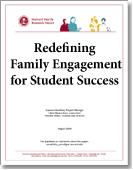The Harvard Family Research Project separated from the Harvard Graduate School of Education to become the Global Family Research Project as of January 1, 2017. It is no longer affiliated with Harvard University.

|
May 2014 Redefining Family Engagement for Student SuccessHarvard Family Research Project |
Article Information
- Full Text (HTML)
- Full Text (PDF: 813 kb)
The topics presented in this paper were originally introduced as commentaries in the August 2009, November 2009, and April 2010 FINE Newsletters.
Family engagement in education is related to a range of benefits for students, including improved school readiness, higher student achievement, better social skills and behavior, and increased likelihood of high school graduation. The strongest research evidence indicates that parental beliefs, attitudes, values, and childrearing practices, as well as home–school communication, are linked to student success. Furthermore, investing in family engagement can be cost effective. For example, schools would have to spend $1000 more per pupil to reap the same gains in student achievement that an involved parent brings.
These research-based findings align with a key principle of Harvard Family Research Project—namely that schools alone cannot meet students’ needs, especially the needs of those students who are the most disadvantaged. These students in particular need the benefits of a complementary learning approach, in which an array of school and nonschool supports complement one another to create an integrated set of community-wide resources that support learning and development from birth to young adulthood. We offer an expanded definition of family engagement that is based on research about children’s learning and the relationships among families, schools, and communities in support of such learning. A clear and commonly shared definition of family engagement can—and, we believe, will—inspire policy and programmatic investments in family engagement, which will in turn contribute to school improvement and student success.
